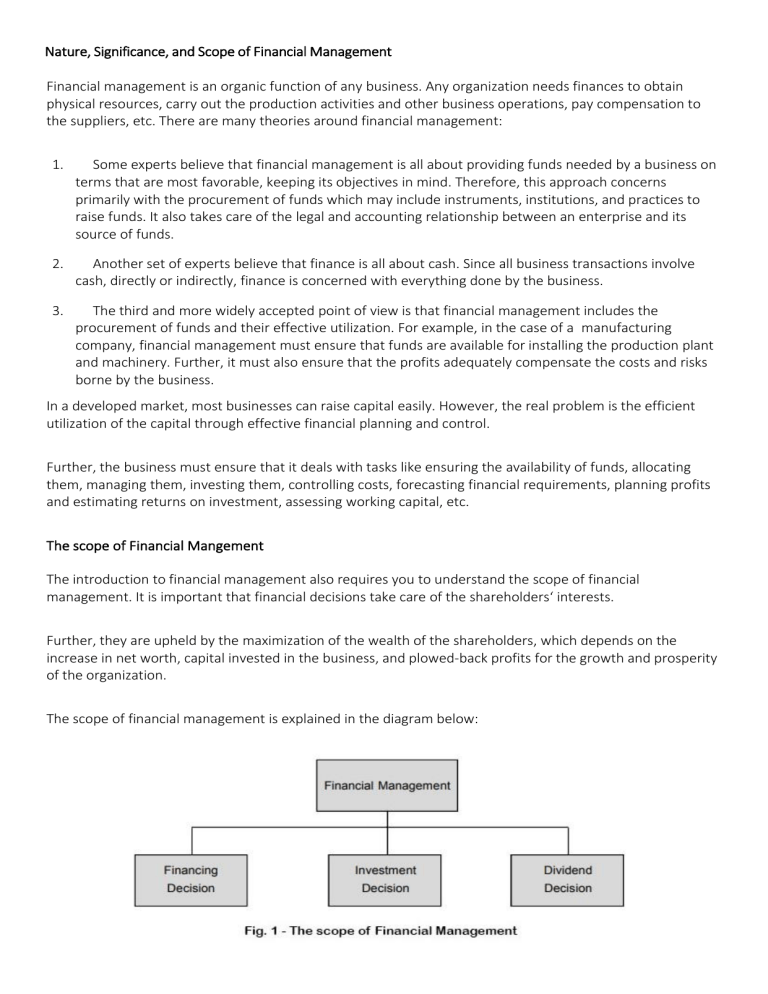
Nature, Significance, and Scope of Financial Management Financial management is an organic function of any business. Any organization needs finances to obtain physical resources, carry out the production activities and other business operations, pay compensation to the suppliers, etc. There are many theories around financial management: 1. Some experts believe that financial management is all about providing funds needed by a business on terms that are most favorable, keeping its objectives in mind. Therefore, this approach concerns primarily with the procurement of funds which may include instruments, institutions, and practices to raise funds. It also takes care of the legal and accounting relationship between an enterprise and its source of funds. 2. Another set of experts believe that finance is all about cash. Since all business transactions involve cash, directly or indirectly, finance is concerned with everything done by the business. 3. The third and more widely accepted point of view is that financial management includes the procurement of funds and their effective utilization. For example, in the case of a manufacturing company, financial management must ensure that funds are available for installing the production plant and machinery. Further, it must also ensure that the profits adequately compensate the costs and risks borne by the business. In a developed market, most businesses can raise capital easily. However, the real problem is the efficient utilization of the capital through effective financial planning and control. Further, the business must ensure that it deals with tasks like ensuring the availability of funds, allocating them, managing them, investing them, controlling costs, forecasting financial requirements, planning profits and estimating returns on investment, assessing working capital, etc. The scope of Financial Mangement The introduction to financial management also requires you to understand the scope of financial management. It is important that financial decisions take care of the shareholders‘ interests. Further, they are upheld by the maximization of the wealth of the shareholders, which depends on the increase in net worth, capital invested in the business, and plowed-back profits for the growth and prosperity of the organization. The scope of financial management is explained in the diagram below: You can understand the nature of financial management by studying the nature of investment, financing, and dividend decisions. Learn more about Supply Chain here in detail. Core Financial Management Decisions In organizations, managers in an effort to minimize the costs of procuring finance and using it in the most profitable manner, take the following decisions: Investment Decisions: Managers need to decide on the amount of investment available out of the existing finance, on a long-term and short-term basis. They are of two types: Long-term investment decisions or Capital Budgeting mean committing funds for a long period of time like fixed assets. These decisions are irreversible and usually include the ones pertaining to investing in a building and/or land, acquiring new plants/machinery or replacing the old ones, etc. These decisions determine the financial pursuits and performance of a business. Short-term investment decisions or Working Capital Management means committing funds for a short period of time like current assets. These involve decisions pertaining to the investment of funds in the inventory, cash, bank deposits, and other short-term investments. They directly affect the liquidity and performance of the business. Financing Decisions: Managers also make decisions pertaining to raising finance from long-term sources (called Capital Structure) and short-term sources (called Working Capital). They are of two types: Financial Planning decisions which relate to estimating the sources and application of funds. It means pre-estimating financial needs of an organization to ensure the availability of adequate finance. The primary objective of financial planning is to plan and ensure that the funds are available as and when required. Capital Structure decisions which involve identifying sources of funds. They also involve decisions with respect to choosing external sources like issuing shares, bonds, borrowing from banks or internal sources like retained earnings for raising funds. Dividend Decisions: These involve decisions related to the portion of profits that will be distributed as dividend. Shareholders always demand a higher dividend, while the management would want to retain profits for business needs. Hence, this is a complex managerial decision. What are the primary objectives of financial management? Answer: The primary objectives of financial management are: Attempting to reduce the cost of finance Ensuring sufficient availability of funds Also, dealing with the planning, organizing, and controlling of financial activities like the procurement and utilization of funds. As per financial literature, Accounting can be divided into three broad categories: 1. Financial Accounting: It deals with the preparation of financial statements and reporting financial information to external users like creditors, government agencies, analysts, investors, bankers, etc. Financial statements, i.e. the income statement and balance sheet indicate the financial position of the business during a given period of time. 2. Management Accounting: Reporting financial information to internal users like management and employees for the policy-making and running a day to day operations of the business. Management accounting is forward-looking and focuses on future activities to achieve business objectives. 3. Cost Accounting: It is a part of management accounting for the cost analysis. Cost accounting makes elaborate cost records regarding various products, operations, and functions. It is a process of determining and accumulating the cost of a particular product or activity. What is Financial Management? It refers to the effective and efficient management of monetary resources (finances and economic) by proper utilization of fixed assets and working capital of the organization. Financial management aids management in better decision-making. Effective procurement and efficient use of finance lead to the proper utilization of monetary resources by the organization. The main objective of financial management is profit maximization and wealth/value maximization. Accounting vs Financial Management Comparison Table The basis of comparison Accounting Financial Management Basic Definition Accounting is a systematic process of identifying, recording, measuring, classifying, verifying, summarizing, interpreting and communicating financial information. Financial management “as an application of general managerial principles to the area of financial decision-making. Primary User Both internal and external users such as creditors, investors, analysts, management, owners and investors, management, employees, customers, the government, and regulators.m Majorly management of the Company and shareholders. Importance Accounting involves in reporting financial information using standard procedures and rules in a meaningful form of financial statements. Financial management involves the assets and resources of the Company and their effective utilization. Objective Reporting financial information Profit maximization and wealth/value maximization. Measurement of fund Accrual basis Cash flow basis Purpose Purpose of accounting is to collect and present the data in a meaningful manner Financial management involves to uses this data for financial decision making purpose. Timeframe Quarterly, Half-Yearly, and Yearly Management can do this activity at any time. Time focus Past-oriented Future-oriented Reports Summary reports in the form of financial statements Detailed report on the future course of action.







